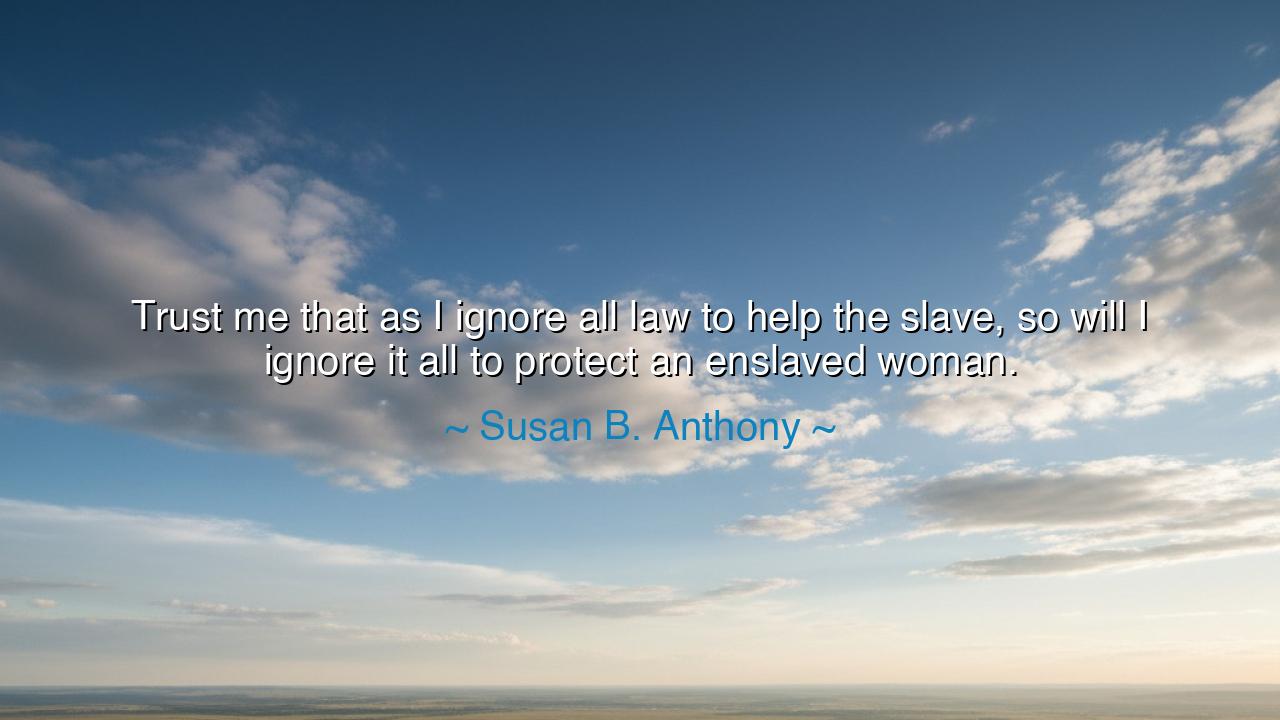
Trust me that as I ignore all law to help the slave, so will I
Trust me that as I ignore all law to help the slave, so will I ignore it all to protect an enslaved woman.






“Trust me that as I ignore all law to help the slave, so will I ignore it all to protect an enslaved woman.” Thus spoke Susan B. Anthony, warrior of conscience and champion of liberty. In her words burns a flame both defiant and divine—a fire that no decree, no chain, no government could contain. She spoke not merely of rebellion against unjust laws, but of moral courage, the sacred duty to place righteousness above legality when the law itself has become an instrument of cruelty. Her voice echoes through the corridors of time, reminding all generations that the highest law is the one written upon the heart of humanity.
This quote arose in the furnace of the nineteenth century, when the chains of slavery still rattled through America and women’s voices were silenced beneath the weight of man’s dominion. Anthony stood beside the abolitionists, defying statutes that condemned those who aided the enslaved. She was no passive sympathizer; she was a rebel of compassion, a herald of divine justice. And when the question of women’s freedom arose, she did not falter. She proclaimed that the fight for liberty must extend beyond race—to every soul bound by injustice, whether in body or in spirit. Her defiance of law was not lawlessness, but a declaration that morality transcends man’s written codes.
The ancients would have recognized her spirit. For they too spoke of the higher law—the Law of Heaven, which no ruler may overrule. When kings decreed oppression, prophets rose to challenge them. When empires demanded silence, philosophers risked their lives to speak truth. So too did Anthony stand against the empire of custom and the tyranny of law. She understood what few dare to grasp: that justice begins where obedience ends. To obey an evil law is to betray the divine spark within; to disobey it in the name of love is to honor the gods themselves.
Let us recall the tale of Harriet Tubman, the “Moses” of her people, who, like Anthony, defied every earthly statute to free the enslaved. Tubman, too, was an outlaw in the eyes of the nation but a saint in the eyes of eternity. She guided men and women through the shadows of the Underground Railroad, risking capture, torture, and death, yet never turning away from the call of freedom. Anthony’s words find their reflection in Tubman’s deeds: both women rejected the false sanctity of laws that chained others, for they knew that law without justice is but a cage made holy by hypocrisy.
When Anthony vowed to “ignore all law,” she spoke not of chaos, but of moral order restored. The true meaning of her rebellion was love—the fierce, uncompromising love that sees the oppressed as sacred and the oppressor as pitiable. She knew that history’s greatest crimes were committed not by the wicked alone, but by the obedient—those who bowed their heads and said, “The law is the law.” But the just soul, she taught, must sometimes stand alone against the multitude, must sometimes say “No” when the world commands “Yes.” For only in that defiance is the seed of redemption sown.
Anthony’s courage also carried a quiet tenderness. When she spoke of protecting an “enslaved woman,” she revealed the double bondage that women bore—enslaved not only by society’s chains but by the silence it demanded of them. She saw that freedom must be complete or it is not freedom at all; that the emancipation of one without the liberation of the other is but half a revolution. Her heart, vast as the sky, encompassed all who suffered under tyranny, be it of race, of gender, or of spirit. She was a guardian of the voiceless and a keeper of the eternal flame of justice.
The lesson, then, is as fierce as it is gentle: never mistake legality for morality, nor peace for righteousness. When the laws of men defy the laws of conscience, stand with the conscience. When silence serves the powerful, speak for the powerless. Let your love be stronger than your fear, your faith deeper than your obedience. For there will come a time when each must choose—between comfort and courage, between the world’s approval and the soul’s salvation.
So remember, children of the future: the truest loyalty is not to nations or to laws, but to truth and compassion. Like Susan B. Anthony, let your hearts be brave enough to break unjust chains and tender enough to lift the fallen. Ignore all law that denies the humanity of another, and you will find yourself standing, as she did, on the sacred ground where justice and mercy meet. For it is there, and only there, that the soul becomes truly free.






AAdministratorAdministrator
Welcome, honored guests. Please leave a comment, we will respond soon